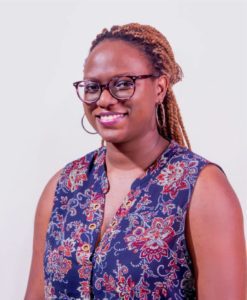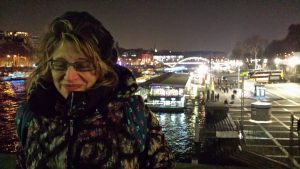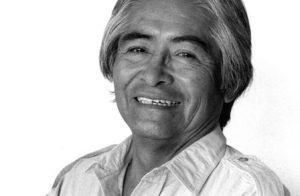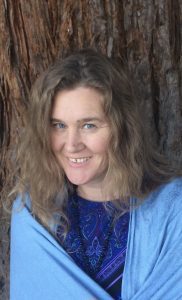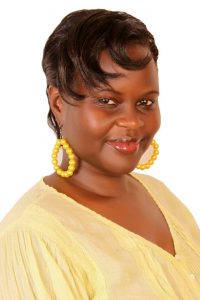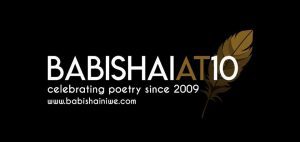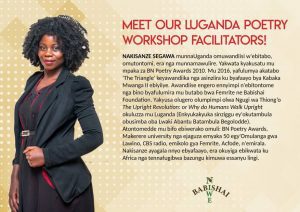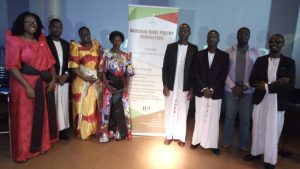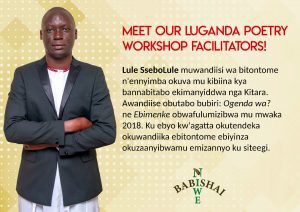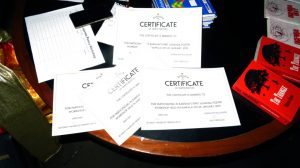BIOGRAPHIES OF THE BABISHAI AT TEN TEAM
21-25 MARCH, 2019
SARAH MARIONE IJANGOLET AKOL
Sarah Marione Ijangolet Akol is the Social Media Manager and Graphics Designer at Babishai Niwe Poetry Foundation.
Sarah is an artist and graphics designer based in Kampala, Uganda, proficient in traditional painting but choosing digital art as a medium of expression – including the design of wearable art in the form of t-shirts and other casual apparel.
Having developed and cultivated a passion for art from a young age, Sarah studied fine art in O and A level at Mt St Mary’s Namagunga and Gayaza High School respectively, and attained a Bachelor’s Degree of Industrial and Fine Art at Uganda Christian University, Mukono in 2017. In 2018, she decided to enrich herself with the skill of Illustration, an interest she developed from exposure to storybooks and comics. She hopes to use this skill to illustrate her own book of Ugandan folk tales.
Sarah is passionate about vector illustration and portraiture and is fascinated by Ugandan folklore and mythology, a lot of her work being an exploration of the rich world of Ugandan fantasy and mythos as passed down from generation to generation. She chooses not to be limited in her depiction of Ugandan deities and supernatural beings, allowing her imagination to stretch and mould their visages and appearances to accommodate how truly extraordinary the tales about them are. In doing so, hopes to conserve as many of these folk tales as possible.
****
LILLIAN AKAMPURIRA AUJO
Aujo (right)
Lillian Akampurira Aujo is a poet and fiction writer from Uganda. She has been shortlisted for The Brtittle Paper Anniversary Award 2018, and longlisted for a Nommo Award 2018. She is a 2017 fellow of the Ebedi Residency in Nigeria. She has presented poetry at the 2017 GIMAC meeting in Addis Ababa. She is the winner of the Jalada Prize for Literature 2015 and the BN Poetry Award 2009, making her the very first honorary winner. Her work has been published by the Caine Prize, Femrite, Babishai Niwe Poetry Award, Prairie Schooner, The Revelator Magazine, Sooo Many Stories, Bahati Books, Jalada Africa, Transition, Omenana, Enkare Review, Brittle Paper, and 20:35 Africa, An Anthology of Contemporary Poetry.
Her poetry has been translated to Malayam, and is set to be taught in the Philippines for a Contemporary African Poetry class.
She has been a mentor in the WritivismAt5 Online Mentoring program.
*****
CINDY LYNN BROWN
Cindy was born in Århus into a Danish/American family. She has been writing her whole life. At the age of six she knew she wanted to be a writer. Each of her books is different because she works thematically and also aims to challenge herself to change the form in every new book. Her poems have a tendency to engage with the world – the diversity, vulnerability, atrocity and absurdity.
She is keen on collaborative writing and cross-over collaborations between writing and other art forms and has indulged in several of these kinds of projects, some are still work-in-progress and others have been completed. She enjoys travelling the world to go to writers’ residencies, conferences and poetry festivals giving talks or performing with her poetry.
She has a Mag Art degree in literature and creative writing and apart from being a writer, she is a translator, an editor and teaches creative writing and English. She has published eight collections of poetry and one novel. Her latest collection Dealbreaker explores the topics of insomnia and sleep.
Cindy has also been the main organizer of an international poetry festival in Odense, Denmark, ever since 2007.
***
SIMON ORTIZ
Simon Ortiz, (born May 27, 1941) is a Puebloan writer of the Acoma Pueblo tribe, and one of the key figures in the second wave of what has been called the Native American Renaissance. He is one of the most respected and widely read Native American poets. Ortiz’s commitment to preserving and expanding the literary and oral traditions of the Acoma accounts for many of the themes and techniques that compose his work. Ortiz identifies himself less as a “poet” than a “storyteller”. The composition of a traditional Pueblo storyteller includes not only oral narrative materials, which adapt easily to short story or essay forms, but also songs, chants, winter stories, sacred oral narratives associated with origin stories and their attendant ceremonies.
Ortiz is a recipient of the New Mexico Humanities Council Humanitarian Award, the National Endowment for the Arts Discovery Award, the Lila Wallace Reader’s Digest Writer’s Award, a National Endowment for the Arts Fellowship, and was an Honored Poet recognized at the 1981 White House Salute to Poetry.
In 1981, From Sand Creek: Rising In This Heart Which Is Our America, received the Pushcart Prize in poetry.
Ortiz received a Lifetime Achievement Award from the Returning the Gift Festival of Native Writers (the Wordcraft Circle of Native Writers and Storytellers) and the Native Writers’ Circle of the Americas (1993
His works:
- My Father’s Song” (poem; 1976 in Going for the Rain)
- A Good Journey(1977)
- The People Shall Continue (Fifth world tales)(2018), book by Lee and Low Books
- Howbah Indians: Stories(1978)
- Fight Back: For the Sake of the People, For the Sake of the Land(1980)
- From Sand Creek: Rising In This Heart Which Is Our America(1981)
- Blue and Red(1982) Children’s Book
- The Importance of Childhood(1982) Children’s Book
- A Good Journey(1984)
- Fightin’: New and Collected Stories(1984)
- Earth Power Coming (1988)
- Woven Stone(selected works) (1992)
- After and Before the Lightning(1994)
- Speaking for the Generations: Native Writers on Writing, editor (1998)
- Men on the Moon: Collected Short Stories(1999)
- Out There Somewhere(2002)
- The Good Rainbow Road: Rawa Kashtyaa’tsi Hiyaani (A Native American Tale in Keres)(2004) Children’s Book
- Ortiz, Simon J. “What We See: A Perspective on Chaco Canyon and Pueblo Ancestry,” Chaco Canyon: A Center and Its World. Museum of New Mexico Press, 1994. An essay.
***
JAMI PROCTOR-XU
Jami Proctor Xu 徐贞敏 is a bilingual poet, translator and mother. She writes in Chinese and English. She grew up in Tucson, Arizona, and currently splits her time between Northern California, Arizona and China. Her books include the Chinese poetry collections include Shimmers (2013) and Suddenly Starting to Dance (2016) and a chapbook of poems in English, Suddenly Starting to Dance (2014).
She translated a collection of Jidi Majia’s poems, Words From The Fire (2018) and a collection of Song Lin’s poems (forthcoming in 2019). Her pohemuems and translations frequently appear in anthologies and she has read at poetry festivals around the world. Since 2016, she has co-organised a annual international poetry and translation event at The Beijing Normal University International Writing Center. She is a writer-in-residence at Hemu, Shuangliu, China and a 2013 recipient of the Zhujiang Poetry Award.
***
BEVERLEY NAMBOZO NSENGIYUNVA
Beverley Nambozo Nsengiyunva is a public speaker, an author, and award-winning poet. She is also the founder of the Babishai Niwe Poetry Foundation, which conducts annual African poetry competitions and publishes African poetry. Beverley holds a Distinction in Creative Writing from Lancaster University, which she received in 2012.
She is the director of Rich Diction; a public speaking training for children, teenagers and adults. Beverley is a 2010 joint first runner-up of the annual international erbacce-press poetry prize.
In 2017, Beverley became the founding President of Bukoto Toastmasters Club; an international public speaking platform. She currently lives in Kampala with her husband and four children, loves to travel, swim and dance. Her desire is to travel to every country in the world before she turns 70.
***
GEORGE GUMIKIRIZA
George is a 22 year old Ugandan currently in my 4th year student at Makerere University doing a Bachelor’s Degree in Mechanical Engineering with a great passion for art and creativity. He likes photography but he bleeds poetry as therapy. George is also a professional chess player, training individuals to compete at National level.
He started engaging in poetry around mid-2016 when he joined a group of poets that were organizing a show to fundraise for the cancer patients called “Poetry for Cancer.
In 2018 George emerged third in the annual Babishai Poetry Competition.
***
DAVINA KAWUMA
Davina is, under and above any and every circumstance, a human being first and a human doing second. The daughter of a research midwife and an ophthalmologist, she’s a lifelong resident of Kampala.
She supposes she’s always written because she’s always read. Isn’t reading, after all, very much like writing?—aren’t both activities a kind of [re]creation? Her poetry and short stories are born out of daily observations of life. Her work has been published by the African Writers Trust, the Caine Prize, the Uganda Women Writers Association, the Babishai Niwe Poetry Foundation, and Lawino magazine. She was recently long-listed for the 2018 SSDA prize.
She has received education in both the sciences (conservation biology) and the arts (education), which explains her resentment of the closely-patrolled divide between the arts and sciences.
She’s a wildlife enthusiast who also likes bicycles, board games, and the Investigation Discovery channel.
***
